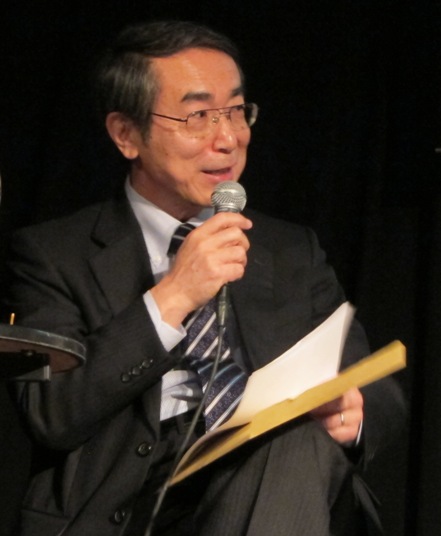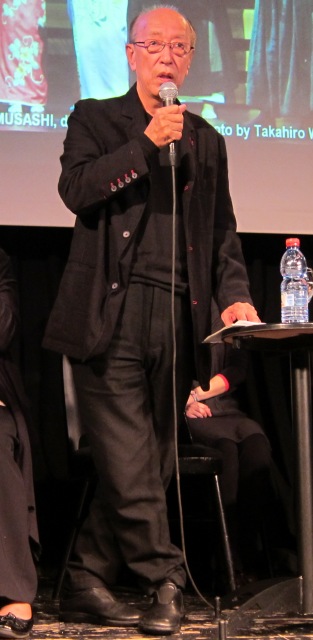Japanese director Yukio Ninagawa will direct Euripedes’ The Trojan Women in a co-production of the Cameri Theatre of Tel Aviv and the Tokyo Metropolitan Theatre. The production will be performed in three languages – Japanese, Hebrew and Arabic with an international cast that will include actors from all three cultures. The play has been newly translated from Ancient Greek for this production, with Shimon Bouzaglo translating into Hebrew, Harue Yamagata into Japanese and into Arabic by Egyptian translator Amin Salaam. The project was initiated by Varda Fish in conjunction with the Cameri Theatre. Ninagawa’s production of The Trojan Women will premiere in Tokyo and Tel Aviv in December 2012.
Yukio Ninagawa arrived in Israel with several of his colleagues, including Sonsho Inoue, a director who has been working with Ninagawa for many years, Tsukasa Nakagoshi, Ninagawa’s permanent set designer, Yuriko Akishima, dramaturg and personal translator to Ninagawa, Harue Yamagata, translator of the play from Ancient Greek to Japanese, Hiroshi Takahagi, Deputy Director of the Tokyo Metropolitan Theatre, Minako Naito, General Producer of Performing Arts, Tokyo Metropolitan Theatre, and Nobuhide Hanei, a director/photographer who is documenting the production process for a film about Ninagawa and for Japanese television. Ninagawa graciously met with the press at the Cameri Theatre with honored guests the Ambassador of Japan to Israel Hideo Sato; Raphael Gamzou, Deputy Director General, Cultural and Scientific Relations; Hiroshi Takahagi, Deputy Director of the Tokyo Metropolitan Theatre and the members of Ninagawa’s entourage, Noam Semel, Director General of the Cameri Theatre.

The co-production of The Trojan Women is one of many events celebrating 60 years of diplomatic relations between Israel and Japan. Ambassador Sato noted that Israel was “one of the first countries that approached Japan after World War II.” The Ambassador has served in Israel in a diplomatic capacity since the 1970s, and speaks Hebrew very well. On a personal note, Ambassador Sato said, “Euripides is one of my favorite writers,” and he is looking forward to the production. Raphael Gamzou said, “We celebrate this political event through culture, Euripides anti-war play has special significance, it is the best expression of the aspirations of our two nations.”
Director Yukio Ninagawa addressed the press in Japanese, and his comments were translated into English. There was much interest in the multi-lingual aspect of the play, on this topic, Ninagawa said, “People who have totally different cultures, each group reaching to the other and understanding each other. That is the power of theatre and in this world of many differences to talk about hope – that is the role of theatre. To portray the tragedy of war and other issues, we’re going to talk through The Trojan Women.” Ninagawa has worked with multi-lingual productions in the past and said that he found it, “very stimulating. I found so many different things through using different languages and different bodies.”
Of his own path in theatre, Ninagawa said, “My generation was forced to learn European theatre since youth. Then we thought: if we don’t learn the theatre of our own country, we won’t be complete. How to blend unite Japanese identity with what we learned? That was the biggest job as director.” Demonstrating the role of body language as well as speech in terms of cultural differences, Ninagawa said and complemented his words with the corresponding actions, “In European theatre when you talk about God you stand, in Japanese theatre you cross you leg to express invisible power. There are fundamental differences in the two different theatres, so we learned to accept each other’s different cultures by learning these differences. Two actresses here today (Ola Shur-Selektar and Raida Adon) participated in workshops in Japan.”

Ninagawa is greatly esteemed internationally, but said that it was far more difficult for him to gain acceptance in his own country: “I have been considered an enfant terrible of Japan theatre because it doesn’t look like European theatre; there is a lot of traditional Japanese theatre. Brecht, Stanislavsky that’s not what I did, so I was not liked… Gradually the Japanese assessment changed. My Macbeth, I placed it on a portable altar. According to Buddhism the souls of the dead, the souls of your ancestors are placed in a box inside that altar. The story of Macbeth developed from Japanese feelings towards ancestry. I have a dialogue and approach Shakespeare in that way. When I did that in Japan, everyone said I was crazy.”
In this production Ninagawa will be working with Arab and Jewish actors alongside Japanese actors, a production without a single common language among the creative team. How does one work with four languages? Ninagawa said, “I don’t understand the small nuances of the language, but when you really open up yourself and look how actors move, I can judge a lot… in order to learn the world and understand it you just have to go for difficult things.”





